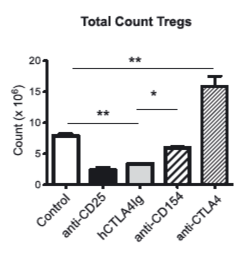Blockade of the B7:CD28 costimulatory pathway has emerged as a promising therapy to prevent allograft rejection. However, results from the belatacept phase III clinical trial demonstrated a higher rejection rate when compared to cyclosporine, raising concern about potential deleterious effects of this agent. In this study, we investigated the consequences of B7:CD28 blockade by hCTLA4Ig on regulator T cell (Treg) generation in different major histocompatibility complex (MHC) mismatch transplant models. Administration of hCTLA4Ig significantly decreased the amount of Tregs in B6 WT animals and this effect was predominant in thymus-induced Tregs (Helios(+) ). Although hCTLA4Ig prevented rejection in a fully allogeneic mismatch model, it accelerated rejection in a MHC class-II mismatch model (MST = 26, p < 0.0001), in which long-term allograft survival is dependent on Tregs. This accelerated rejection was associated with a marked reduction in thymus-induced Tregs and led to a higher effector/regulatory T-cell ratio in secondary lymphoid organs and in the allograft. This study confirms the importance of the B7:CD28 pathway in Treg homeostasis in an in vivo transplant model and suggests that hCTLA4Ig therapy may be deleterious in circumstances where engraftment is dependent on Tregs.
Deleterious effect of CTLA4-Ig on a Treg-dependent transplant model.
Riella LV, Liu T, Yang J, Chock S, Shimizu T, Mfarrej B, Batal I, Xiao X, Sayegh MH, Chandraker A.
Am J Transplant. 2012 Apr;12(4):846-55.

